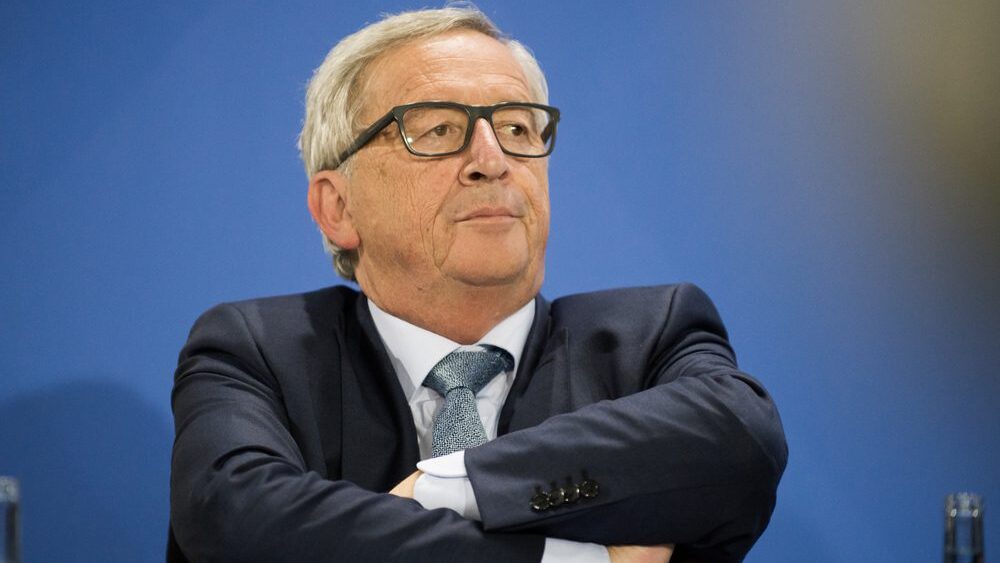
Jean-Claude Juncker
Photo: photocosmos1 / Shutterstock.com
There will be no quick or easy decision on when Ukraine and other EU candidate countries can join the European Union, as EU members are visibly in disagreement with each other on setting a timeline, while former European Commission President Jean-Claude Juncker has said the EU should not make false promises to Ukraine.
“I am very angry that some voices in Europe are telling Ukrainians they can become members immediately. That wouldn’t be beneficial either for the EU or Ukraine. Anyone who has dealt with Ukraine knows that it is a country that is corrupt at all levels of society,” Juncker told the German publication Augsburger Allgemeine. The Luxembourgish former prime minister said Ukraine is not ready to gain entry to the EU and needs to carry out “massive internal reforms” to be let in.
President of the European Council Charles Michel, on the other hand, has set out a very optimistic timeline for war-ravaged Ukraine to join the European Union, telling German publication Der Spiegel that Ukraine could become a full member of the EU by 2030, “if both sides do their homework.” Michel believes that setting a date for EU enlargement would be “a clear incentive for all of us to prepare and accelerate our efforts,” and that the EU must react to the growing influence of Russia and China in the Western Balkan region.
I met with @CharlesMichel.
— Volodymyr Zelenskyy / Володимир Зеленський (@ZelenskyyUa) October 5, 2023
Ukraine is grateful for the EU’s strong and lasting support, as well as the practical assistance of EU member states.
The recent meeting of EU foreign ministers in Kyiv had significant symbolic and practical meaning. It underlined the unwavering EU… pic.twitter.com/DeFjGPHKb8
Albania, Montenegro, North Macedonia, and Serbia have started accession negotiations that are progressing extremely slowly. Bosnia, Moldova, and Ukraine have received EU candidate status, while Georgia and Kosovo have only applied to become EU members. Turkey’s EU accession negotiations started in 2005, but have been frozen due to a myriad of political disagreements.
While most EU member states agree that the enlargement of the currently 27-member EU should happen sooner or later, mainly for security reasons and to counter external powers’ influence-gaining, there is disagreement on how it should happen. An expert commission, led by the European affairs ministers of Germany and France, published a report last week, arguing that an EU made up of thirty or more countries can only make decisions effectively if the bloc switches to qualified majority voting on issues such as taxation, security, and migration—a plan opposed by countries like Hungary and Poland, who believe it infringes their sovereignty.
Enlargement is being discussed in Granada, where the gathering of the 47-nation European Political Community (EPC) took place on Thursday, October 5th—an informal group that includes all 27 European Union countries and many NATO member states, along with their European neighbours, but excluding Russia. The leaders of the EU will also talk about the issue in their negotiations on Friday.
Among the opponents of the 2030 timeline is Portugal, whose Secretary of State for European Affairs, Tiago Antunes, warned on Wednesday that candidate countries must first “speed up their reform process, particularly about the rule of law, which is an essential and basic aspect.” Ireland’s Minister of State for European Affairs Peter Burke also said that while Ireland was in favour of enlargement, “candidate countries must, on a merit-based approach, measure and comply with all the criteria before negotiations are opened.”
In an interview with French weekly Le Point, János Bóka, Hungarian minister for European affairs, highlighted Hungary’s support for EU enlargement based on merits and the importance of respecting minority rights in accession negotiations. He was referring to Ukraine curbing the rights of Hungarian ethnic minorities in the country. Frustration with Ukraine has also grown in Poland, whose Minister of Agriculture Robert Telus recently said that Poland will not allow Ukraine to join the EU unless measures are put in place to restrict the entry of its agricultural products. Kyiv sued Warsaw, Budapest, and Bratislava at the World Trade Organisation for banning the import of Ukrainian grain.
An internal EU report seen by the Financial Times reveals the financial implications of enlargement: it estimates that with nine new member states, the current EU budget would increase by 21% to €1.47 trillion, and Ukraine’s accession to the EU would entitle Kyiv to about €186 billion over seven years. This means “all member states will have to pay more to receive less from the EU budget; many member states who are currently net receivers will become net contributors.”
Nonetheless, EU leaders are expected to agree on Friday that the EU “needs to undertake the necessary internal groundwork” to expand to include as many as 35 member states, according to a draft declaration seen by EUobserver.
